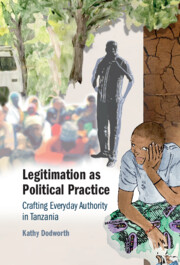Book contents
- Legitimation as Political Practice
- Legitimation as Political Practice
- Copyright page
- Dedication
- Contents
- Figures
- Tables
- Foreword
- Preface and Acknowledgements
- Abbreviations
- Introduction
- 1 Legitimacy and Legitimation
- 2 Practicing Legitimation
- 3 ‘We Go Deeper’
- 4 ‘In and Out’
- 5 ‘I Was Chosen; It’s the Work That’s Voluntary’
- 6 ‘These People, They Just Sit!’
- 7 ‘Reporting Has All Sorts of Issues!’
- Conclusion
- Appendix A: Interviews
- Glossary
- References
- Index
Conclusion
Everyday Legitimation in Tanzania and Beyond
Published online by Cambridge University Press: 05 May 2022
- Legitimation as Political Practice
- Legitimation as Political Practice
- Copyright page
- Dedication
- Contents
- Figures
- Tables
- Foreword
- Preface and Acknowledgements
- Abbreviations
- Introduction
- 1 Legitimacy and Legitimation
- 2 Practicing Legitimation
- 3 ‘We Go Deeper’
- 4 ‘In and Out’
- 5 ‘I Was Chosen; It’s the Work That’s Voluntary’
- 6 ‘These People, They Just Sit!’
- 7 ‘Reporting Has All Sorts of Issues!’
- Conclusion
- Appendix A: Interviews
- Glossary
- References
- Index
Summary
Legitimacy studies, even those more sociologically attuned, remain committed to ascertaining the presence or absence of legitimacy. What appears to embrace fluidity, iteration and hybridity ultimately proves static in its binary yes/no conception. This book’s intent was to embrace the multiplicity, multivalency and making of legitimation in postcolonial contexts. Each non-governmental organization (NGO) intervention is legitimated iteratively; a static belief in the legitimacy of an NGO, or of NGOs in general, has no meaning. Furthermore, legitimation practices are mutually constitutive even when placed in opposition to each other. At that moment in Tanzania, in the wake of peak liberalization, this book mapped two nexuses of legitimation practice: territoriality/representation/materiality and state/extensity/voluntarism, playing out to different effect in different circumstances. Each nexus is transitory, subject to cumulative change and reconfiguration over time. Given this, the informal legitimation practices so-honed by NGOs in tight spaces will prove critical to non/state survival and its cautious expansion in Tanzania and beyond. This chapter thus lastly comments on prospects for broader non/state legitimation within authoritarian capitalist futures.
- Type
- Chapter
- Information
- Legitimation as Political PracticeCrafting Everyday Authority in Tanzania, pp. 200 - 209Publisher: Cambridge University PressPrint publication year: 2022

